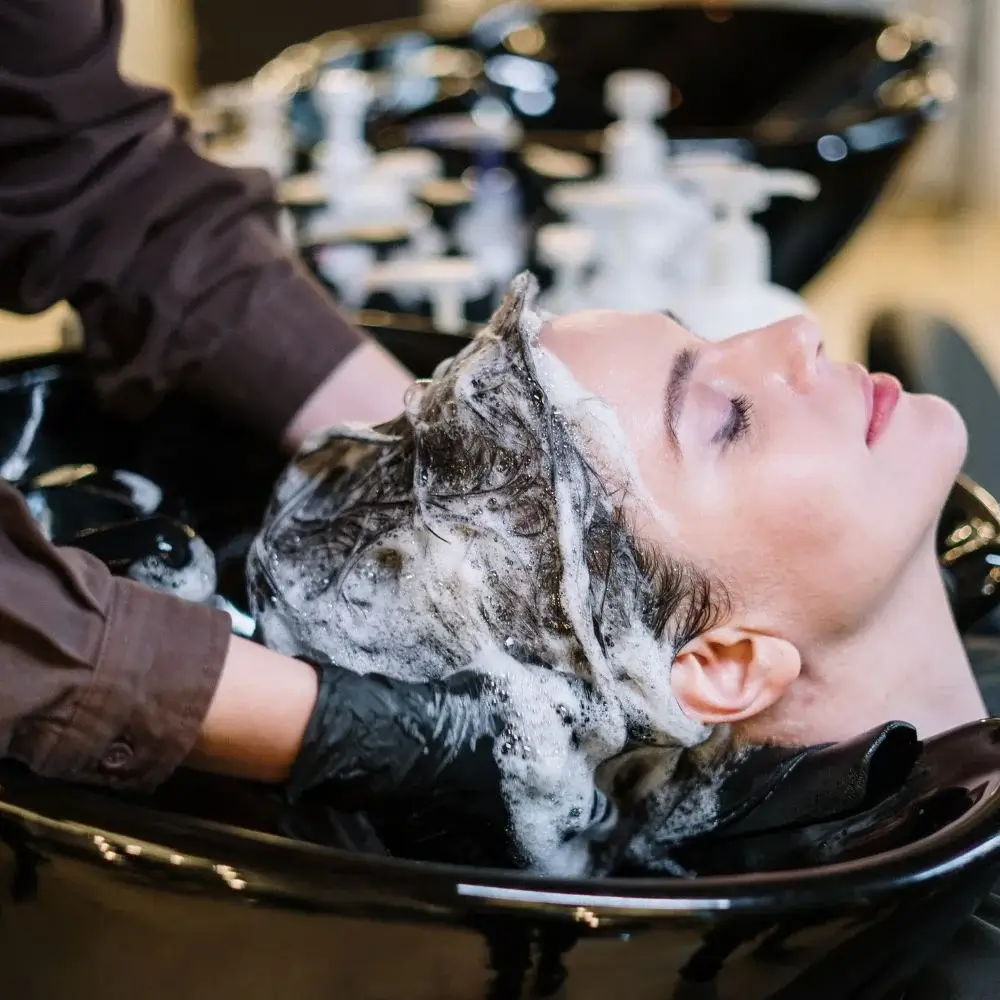Every fashion lover knows how important it is to keep their hair healthy and glowing. With so many shampoos and conditioners in the market, finding the right one for your luscious locks may be overwhelming. However, if you're looking for a game-changer, consider a product that contains hyaluronic acid. In this blog, we will discuss how hyaluronic acid benefits your hair when used in shampoo and why you should make this an essential part of your hair care routine.
Restores Moisture
Hyaluronic acid is a chemical compound naturally found in our skin cells, and it plays a vital role in retaining moisture. When used in shampoo, it helps restore the moisture in your hair strands, leaving them looking shiny and bouncy. Dry hair is prone to breakage, which makes it harder to style, but shampoos with hyaluronic acid can help prevent hair breakage and improve hair elasticity.
Soothes Irritation
Hyaluronic acid has anti-inflammatory properties, which makes it helpful in soothing an itchy scalp or other scalp irritations. It can lead to flaking and dandruff if your scalp is itchy or inflamed. Shampoo products containing hyaluronic acid help relieve these symptoms, leaving your scalp feeling refreshed and healthy.
Adds Volume
When hair is dry or thin, it can appear flat and lifeless. Using shampoo with hyaluronic acid can help add volume without the need for other products. This compound helps hydrate your hair from the inside out, allowing it to retain moisture and appear fuller. Thus, you can have healthier hair suitable for any hairstyle you wish to try out.
Reduces Frizziness
Hyaluronic acid also has conditioning properties that can help reduce frizziness. When hair is dry, it can become frizzy and fly away, making it challenging to style. Shampoo products with hyaluronic acid can help condition the hair, reducing frizz and making it appear smooth and shinier.
Restores Shine
One of the most significant benefits of a shampoo with hyaluronic acid is that it restores shine. This compound improves the hair's overall appearance, adding vibrancy and gloss when used regularly. With its ability to retain moisture and prevent breakage, your hair looks glossy, healthier, and more robust.
Keeping your hair healthy and nourished requires proper care and maintenance. Hyaluronic acid is a fantastic compound with excellent benefits for your hair, and using it in shampoo can help restore moisture, reduce frizz, soothe irritations, add volume, and restore shine to your locks. If you have dry or damaged hair, using shampoos with hyaluronic acid can help you get the luscious locks you've always desired. So, choose your shampoo wisely and enjoy a good hair day every day!
Say goodbye to dry, brittle hair with our top pick for the Best Hyaluronic Acid Shampoo! After rigorous research, we've found the perfect product to leave your locks feeling soft, silky, and rejuvenated. With the power of hyaluronic acid, this shampoo profoundly hydrates and replenishes your hair, restoring its natural shine and strength. Not only will your hair look and feel amazing, but you'll also love the ease and convenience of incorporating this shampoo into your daily hair care routine. Don't wait any longer to achieve gorgeous, healthy-looking hair - follow the link to discover your new favorite Hyaluronic Acid Shampoo today!
What are some common misconceptions about Hyaluronic Acid Shampoo?
There are several common misconceptions surrounding Hyaluronic Acid Shampoo. One prevalent misconception is that it is exclusively suitable for individuals with dry hair. In reality, Hyaluronic Acid Shampoo is versatile and can benefit various hair types, including those with normal or oily hair. Another misconception is that it is primarily a skincare ingredient but equally effective for hair, providing deep hydration and moisture retention. Some individuals may also mistakenly believe it can make their hair greasy, but it should not leave it feeling oily when used correctly and in moderation.

What are the environmental impacts of using Hyaluronic Acid Shampoo?
Hyaluronic Acid Shampoo's environmental impact is generally lower than traditional shampoos. Most Hyaluronic Acid Shampoos are formulated to be biodegradable, which means they break down more quickly in the environment, reducing harm to aquatic ecosystems. However, it's worth noting that the production process of these shampoos may involve some energy consumption and waste generation. To minimize the environmental impact, consider choosing Hyaluronic Acid Shampoo brands that use eco-friendly packaging and prioritize responsible ingredient sourcing. Besides, using only the recommended amount per wash can further reduce waste and minimize energy use associated with its production.

What precautions should I take when using Hyaluronic Acid Shampoo?
Following certain precautions is essential to ensure a positive experience when using Hyaluronic Acid Shampoo. Avoid excessive use, as overuse can lead to product buildup on your hair and scalp. Always adhere to the manufacturer's instructions for the best results. If you have sensitive skin or a history of allergies, it's advisable to perform a patch review before incorporating the shampoo into your regular hair care routine. If the shampoo comes into contact with your eyes, rinse thoroughly and avoid further contact. If irritation persists, discontinue use and consult a dermatologist for guidance on alternative products.

How should I store Hyaluronic Acid Shampoo to prolong its effectiveness?
Proper storage is essential to prolong the effectiveness of your Hyaluronic Acid Shampoo. Store the shampoo in a cool, dry place, away from direct sunlight. Sealing the bottle tightly after each use is crucial to prevent air and moisture from compromising the product's composition. Avoid exposing the shampoo to extreme temperatures, which can alter its chemical properties. By keeping it in a stable environment, you'll help preserve its moisturizing benefits, ensuring that it continues to perform optimally throughout its usage.

How does Hyaluronic Acid Shampoo compare to silicone-based hair products?
Hyaluronic Acid Shampoo and silicone-based hair products serve different purposes and have distinct characteristics. Hyaluronic Acid Shampoo primarily provides deep hydration and moisture retention for your hair. It penetrates the hair shaft and nourishes it from within, promoting long-term health and a natural luster. In contrast, silicone-based products create a temporary smoothness by coating the hair shaft, offering a quick fix for frizz and damage. However, prolonged use of silicone-based products can lead to product buildup, weighing down your hair and potentially reducing shine. Therefore, choosing the two depends on your specific hair care needs and preferences.
How does Hyaluronic Acid Shampoo compare to silicone-based hair products?
Hyaluronic Acid Shampoo and silicone-based hair products serve different purposes and have distinct characteristics. Hyaluronic Acid Shampoo primarily provides deep hydration and moisture retention for your hair. It penetrates the hair shaft and nourishes it from within, promoting long-term health and a natural luster. In contrast, silicone-based products create a temporary smoothness by coating the hair shaft, offering a quick fix for frizz and damage. However, prolonged use of silicone-based products can lead to product buildup, weighing down your hair and potentially reducing shine. Therefore, choosing the two depends on your specific hair care needs and preferences.
Should I combine Hyaluronic Acid Shampoo with a deep conditioning treatment?
Combining Hyaluronic Acid Shampoo with a deep conditioning treatment can be highly beneficial for achieving optimal hair health and moisture balance. Hyaluronic Acid Shampoo sets the foundation by providing essential hydration to your hair strands. When followed by a deep conditioning treatment, which offers intensive repair and nourishment, you can expect smoother, softer, and more manageable hair. This combination is particularly advantageous for individuals with dry or damaged hair, as it addresses immediate and long-term hydration needs. However, adjusting the frequency of deep conditioning based on your specific hair type and condition is essential, as excessive use may only be suitable for some hair types.







